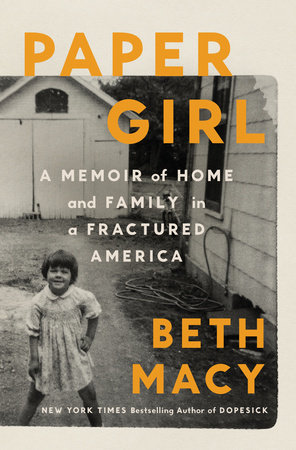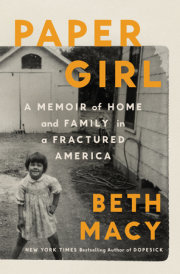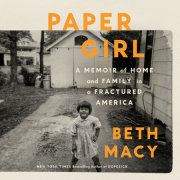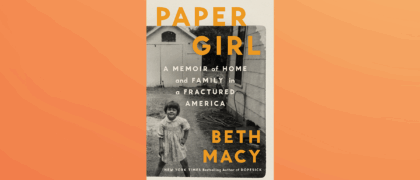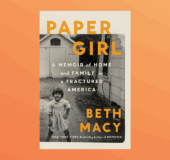It was June 2023, and Silas James had just graduated from Urbana High School, forty-one years after I wore that same insignia. It was a moment that was supposed to be the launching pad for his new identity and new life, as my graduation had been. It was meant to signify a break from the family chaos that had permeated most of his eighteen years.
Two full scholarships were all teed up and waiting for him at a community college in a nearby city. He planned to become a welder. Companies need welders, he knew. The nation needs welders. The pay was more than anything anyone in his family, save a few drug dealers, had ever made. And this was legit.
For Silas, manipulating metal and gas wasn’t just a way to get the hell out of Urbana, Ohio; it made him feel like an artist.
He’d been so nervous about starting college that when I asked if he took a test-drive
to Clark State in Springfield, Ohio, the week before, he shot back: “One hundred percent, I drove an hour away just to practice.”
After his first class, he called me from the cafeteria: He’d just ordered a chicken quesadilla and a strawberry smoothie, and he was thrilled. He loved that he’d flashed his student ID to the cafeteria workers, he loved the sliding-scale health center, and he adored Toni, the mentor they’d assigned to him as a first-generation college student. “Everything you can think of, they have it here,” he marveled. He’d even made a potential new friend in a classmate who wore ear gauges the same size as his.
And the fact that the college webmaster had posted his photo on the home page during the first week of school? Silas had never imagined that when he was homeless, during long stretches of his junior and senior years of high school, nearly dropping out several times.
But on the third day of class, the head gasket blew on his Saturn Ion, a beater that was older than Silas by three years. The car was a goner. The next day, a relative he was staying with was injured in a car accident and left the hospital with a concussion so severe she required
around-the-clock supervision. Which is how he ended up a college dropout before the end of his first semester’s first week. The family organizing and caretaking had fallen to Silas, as it often did.
Even his graduation had been a bust. He found himself ruminating on his grandparents, who’d spent four days driving from Texas on the back of a single motorcycle for his commencement, only to skip the ceremony because their vision prevents them from driving at night. He hadn’t seen them since the eighth grade, and at the restaurant they took him out to for lunch, they barely managed three sentences. “They seemed burdened to be here,” Silas told me.
He thought about his favorite high school counselor, Mrs. Flowers, who came to his graduation party at the city park and handed him a card with $100 cash as the skunk of his relatives’ weed enveloped her. His older sister had gone camping and skipped the festivities altogether. He thought about his truancy officer, Brooke Perry, who’d pulled strings to get the school district to send a van to pick him up from one of his several temporary homes outside the county.
For years, teachers and counselors had been praying and pulling strings for Silas to graduate, extending shoulders and untold hours of support and sometimes even their spare bedrooms. For his own safety and mental health, they wanted him to get the hell out of Urbana.
As drum major, Silas wasn’t just the leader of the Urbana High School Marching Band; he was also the student who spent every lunch period in the band director’s office, sometimes crying, sometimes joshing with Mr. Sapp, but always plotting ahead with his favorite teacher about the next band routine, the next test, the next step of his life.
He’d pursued the drum major position his sophomore year with a single-mindedness that impressed Mr. Sapp. To become the one who led the marching band onto the field and directed songs and twirling routines, there were two requirements: You had to be able to fully execute a back bend, with the feathers of your hat plume kissing the ground; and you had to fit into one of the two drum major uniforms that Mr. Sapp, with his dwindling band budget, could afford to buy.
“He took it very seriously,” Mr. Sapp told me. “He went to all the clinics, and he practiced and practiced and practiced.”
The small uniform fit Silas’s 120-pound, five-two frame as if it were tailor-made. Though his legal name was still Elizabeth James, he’d become trans and changed his name during junior year. When we met in early 2023, he was eighteen and just beginning to give himself testosterone injections. He picked the name Silas because it sounded like “silos”; he’d always been surrounded by farmland, always reveled in the way the grain storage towers punctuated the rolling midwestern landscape. His mom chose Cole, his new middle name, from a list of names he’d sent to her in jail. In his heart, he would always be a proudly rural kid.
Mr. Sapp often still slipped and called Silas “she” or “Elizabeth” or even “Shug,” the name he went by for a brief period before he landed on Silas. The students all call Mr. Sapp “David M. Sapp, director of bands,” which is a mouthful. It’s one of the many band-kid jokes they make about him, along with ribbing him about his goofy ties and ever-present Crocs.
I could identify with Silas. I too had been a student bandleader at this same high school and came from a childhood with its share of chaos, addiction, and utility cutoff notices. In a region where most of the industry is based on transportation—not far from where Orville and Wilbur Wright first invented flight—I could pinpoint exactly how much a crap car limited a rural kid’s ability to improve their lot. It didn’t just keep you from getting back and forth to your shift job;
it had the potential to keep you from arriving at a new and better life.
It’s not just having a car that actually starts every time that people on the other side of poverty take for granted. My mom struggled to buy me a used trumpet in the fifth grade, paying another family in town for it in monthly installments. While I have never been homeless—
mainly because my grandmother next door owned the house we lived in rent-free—I’m not exaggerating when I say it was a miracle that I left Urbana for Bowling Green State University in my mom’s rusted Mustang, praying the whole way that its slippy clutch would not give out. I had the good fortune to leave town before falling into premature parenthood or addiction, both of which have saddled many of my family members for four generations that I know of,
maybe more.
As I got to know Silas, I was struck by how much harder the situation was for him than it was for me. The more time I spent back in my hometown, the more I recognized the unprecedented forces that were actively turning the community I loved into a poorer, sicker, angrier, and less educated place.
It’s not as if Urbana had ever been utopia for me; I was among the poorest kids in my class, and I felt it. Not just as I delivered newspapers from the back of my ten- speed, befriending people up and down the class ladder, but also on my block of South Walnut Street, where slurry voices from inside our house sometimes pierced the joyful noise of our kickball games and hide-and-seek.
I found refuge in my friends’ homes and on the pleather ottoman inside the living room of my grandma Macy, who taught me to read and write and how to play checkers. I took solace in the public library down the street, the public school I could also walk to, and the women in charge of these sacred places who were my demigods.
Decades later, around 2015, as my mom began her descent into dementia, I began noticing something different during trips home to see her. Something was rotting beneath the surface of my postcard- cute hometown. It wasn’t just that kids like me weren’t going away to college anymore; many weren’t even finishing high school.
The newspaper I used to deliver and later wrote for had become a ghost of its former self, no longer employing paper girls like me or much of anyone. Where it used to cover everything from DUIs to city council meetings to fire station fundraisers, readers were now left to rely on press releases and Facebook posts, creating a gaping information void in my community’s understanding of itself. People now knew every detail of what their national political candidates were saying and doing, but almost nothing about the lives of their neighbors.
A few years ago, an old friend and I were driving around Urbana when we passed a middle- aged man riding a bicycle in the afternoon. When I admired the new‑to‑me bike path stretching from Cincinnati to Toledo that bisected the heart of our hometown, my friend set me straight: Unless they’re donning spandex, middle-aged dudes riding bikes without helmets signifies they’re on probation for DUI and can’t drive. If I saw those same men sitting on a front porch in the middle of the day, it was safe to assume they were on disability and/ or out of work.
Something was happening to our beloved hometown that didn’t quite fit the pat explanations offered by economists and sociologists, important as they were.
It’s not that the usual way of understanding what happened to a town like Urbana isn’t fundamentally true. It’s just so much more complicated, as invisible and ingrained as the air we breathe and the way we talk to each other—and don’t talk. But yes, absolutely, in my once prosperous hometown, the middle class had imploded by way of technology, offshoring, and the decline of unions, beginning in earnest not long after I left Ohio in the mid-1980s.
Back then, many homegrown companies were already morphing into international conglomerates. As production moved to countries with cheaper wages, our nation’s leaders talked a good game about training young people for new jobs. But American students fell behind other nations in science, technology, and math, and the free market, freed to send the jobs away, did just that. Politicians from both parties saw globalization as inexorable, just a natural part of American capitalism’s aging process. As long as our 401(k)s were still growing, it was easier to look away.
France, Germany, and other countries that also participated in globalization haven’t suffered the same levels of child poverty, wage stagnation, or income inequality that the United States has. But that truth is not very palatable. Many Americans, especially those who have the good fortune to be wealthy, argue that low-wage suffering is the cost of national greatness or what economists call creative destruction; that Europe doesn’t have a company like Apple; that it’s one thing or the other. There’s a magnificent cruelty embedded in those sentiments.
I’ll never forget that moment in the 1970s when my dad landed a coveted union job painting the brand-new Upper Valley Mall in Springfield. For years after, we marveled every time we drove past the shiny white automotive bay doors he’d painted, recalling that rare window when we got to eat T‑bone steak. One in three full-time workers carried union cards when I was coming of age, but now that number is one in ten.
But any real reckoning with all the changes to the American heartland must extend beyond economics. If I lay out life in Urbana today and measure it against life there when I was growing up, the biggest shocker to me is the staggering decline of education, in both the formal and the informal senses of the word. Not just how we acquire skills, but also how we learn to be human beings with each other. How we learn structure and responsibility and ambition, formally but more important through role models, including bosses at after-school jobs, other people’s parents, and, most of all, life-changing teachers—all the bulwarks of a thriving middle class. However desperate my circumstances, it was unthinkable to me not to go to school. School was my sanctuary, the place where I felt most appreciated and most myself.
How does a community lose contact with its faith in schools? And what happens when it does?
Copyright © 2025 by Beth Macy. All rights reserved. No part of this excerpt may be reproduced or reprinted without permission in writing from the publisher.

